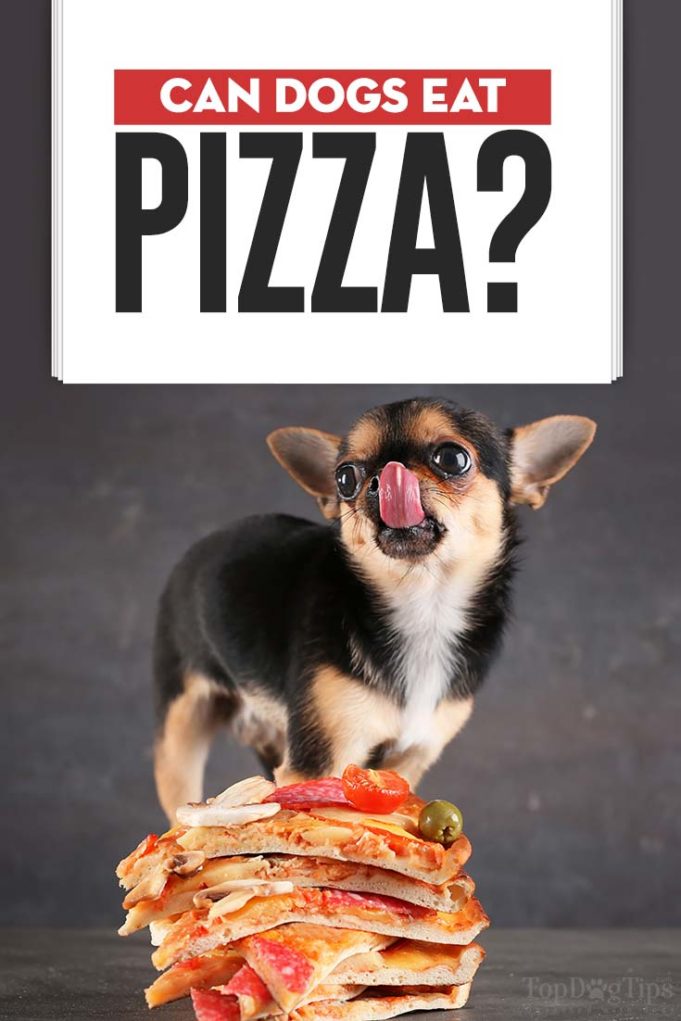Pizza is a long-established, go-to food enjoyed by many people around the world.
Brought to America by Italian immigrants in the late 1800s, pizza is now considered a traditional American meal often made or ordered for dinner and frequently the food of choice for parties.
And we all know dogs love any human food, not knowing what's good and bad.
You're probably wondering, well can my canine companion enjoy enjoy some of this pizza with me?
But can dogs eat pizza as well, or is pizza bad for dogs?
The answer is NO – giving your dog pizza is not recommended.
While most dogs would enjoy a slice of pizza, this is simply not a good food choice for them because of poor nutritional value and side effects.
In this article, we'll discuss more about what pizza is made of, can dogs eat pizza ever, what would be the benefits (if any), and is pizza bad for dogs and why.
ALSO READ: Can Dogs Eat Marshmallows?
What is pizza?
Pizza is cooked flatbread topped with cheese and tomato sauce. It is often combined with toppings ranging from meats to vegetables to spices and condiments.
Pizza can be made fresh or stored frozen and sold as a whole pie or by the slice. It is one of the most popular forms of fast food in America.
Today, pizza is the number one most popular junk food in the United States (Powell et al. 2015).
Originating in the 10th century, pizza today has expanded to a variety of styles. Some of the most popular kinds of pizzas in the United States are deep-dish Chicago, Greek, and New York styles.
If you happen to not know what pizza is well this is what pizza looks like:
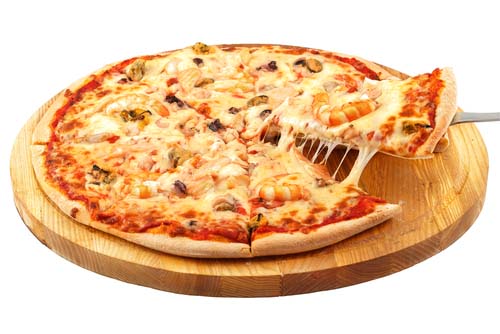
Pizza consists mostly of cooked bread dough, sauce, and cheese formed into a pie-shape.
It is a very delicious but not very nutritious food. I mean
Add a variety of toppings, and it can become an even less healthy choice.
RELATED: 4 Most Dangerous Ingredients in Dog Foods (According to Science)
Pizza for Dogs 101 Can Dogs Eat Pizza?

Can dogs eat pizza at any time, and is there a reason to give pizza for dogs? No – dogs should not eat pizza ever.
There is never a reason to feed pizza to your dog other than satisfy those begging eyes, which would only make the matters worse.
Just about any dog would happily wolf down a slice of good pizza, but that doesn't mean pizza is a good food selection for them.
Some of the ingredients used in the pizza may be good for the dog when given separately in a fresh form.
However, most of the toppings are not beneficial to your dog's health and may, in fact, be toxic ingredients to them.
Even potentially good ingredients aren't suitable since they are likely to be salted or have sauce on them.
The majority of pizzas will also use processed meat.
For example, I love pepperoni pizza, and I'm sure my dog Belle would love it too.
But we've previously investigated how harmful processed meat is for dogs in our bologna meat article.
To sum it up, studies have shown that processed meat causes cancer, obesity, and heart disease in humans and animals alike (1, 2, 3, 4).
While giving your dog a tiny bit pizza may not cause severe damage to your dog's health, it may, at the very least, cause stomach pain and an upset stomach.
You can almost guarantee it will ultimately mess up their digestive system.
Even feeding your dog homemade pizza is a bad idea.
And feeding pizza to your dog on a regular basis leads to more serious health complications in the future.
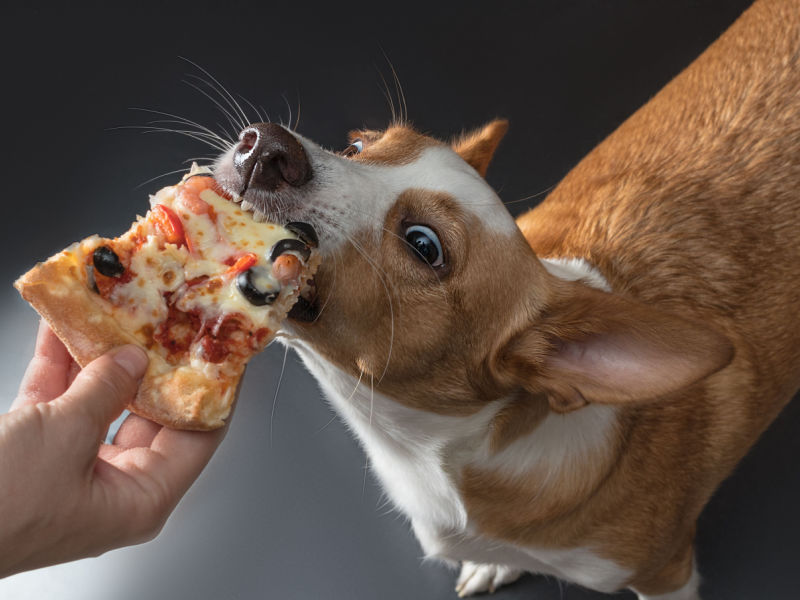
There are no benefits of pizza for dogs
Can dogs get at least some of the benefits from the toppings on the pizza?
The answer is no – none of the foods on a pizza are likely to be suitable for the dog.
There is little to no nutritional value in pizza for dogs, and some of the ingredients included in the pizza or used to garnish the pizza are not dog-friendly ingredients.
It doesn't matter if it's store-bought pizza or homemade pizza, just don't do it.
It's best to stay clear of pizza when looking for food for your dog.
Instead, pick a healthy treat that isn't hazardous to dogs' health and even provides health benefits, and carries a good nutritional profile.
Instead of pizza, try giving your dog natural peanut butter or canned pumpkin.
ALSO READ: Can Dogs Eat Cantaloupe?
5 Potential Side Effects of Pizza for Dogs
1. Dogs' are lactose intolerant

Because cheese is a dairy product, and because most dogs are lactose intolerant and not designed to digest milk products, pizza with cheese topping will make digestion problematic for canines.
Additionally, the cheese varieties used in pizza are very high in fat content, which is not healthy for dogs and difficult to digest.
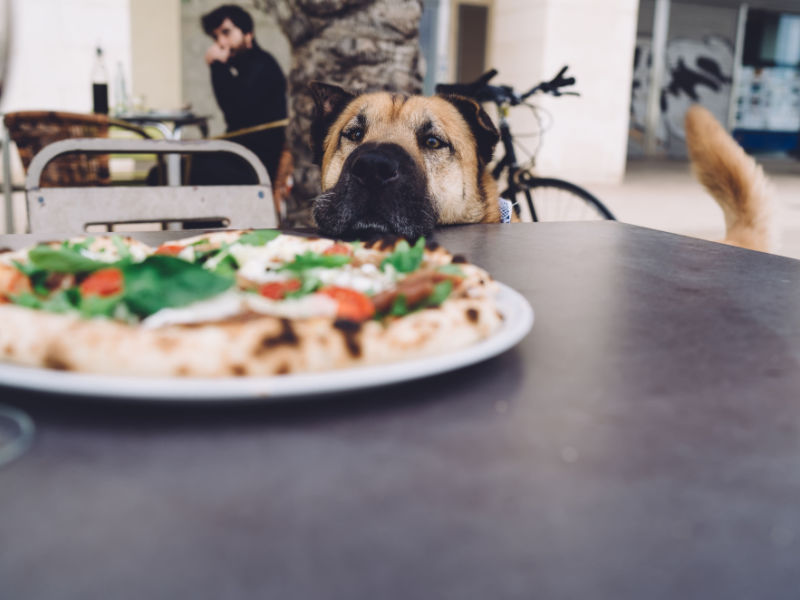
2. The onions and garlic often used in pizza are dangerous to a dog's health.
Two ingredients often used in or on pizza, garlic and onions, are known toxins to dogs.
Both of these foods are part of the allium family, contain thiosulfate, and cause irreparable oxidative damage to red blood cells.
Studies have shown it does not take a significant amount of garlic or onion to produce harmful changes in a canine's blood.
The symptoms of onion or garlic poisoning won't be evident until a few days after consumption when damage has already been done.
Dogs can suffer from hemolytic anemia, a life-threatening condition. Other symptoms of anemia include:
- Weakness
- Lethargy
- Abnormal or red-colored urine
- Vomiting
- Diarrhea
- Depression
- Loss of appetite
- Dehydration
- Abdominal pain
- Jaundice
- Rapid breathing
3. Tomato sauce is not healthy because of its high sodium content.
Tomatoes in and of themselves are not a harmful vegetable to a dog.
When dogs eat pizza sauce, there is significant amounts of salt, along with more sugar and spices, are added to the tomatoes to make the pizza sauce.
High sodium content is not safe for dogs to ingest.
It can cause immediate gastrointestinal issues, and further health concerns, like high blood pressure and heart disease.
Exposure to large quantities of sodium may even be life threatening a dog.
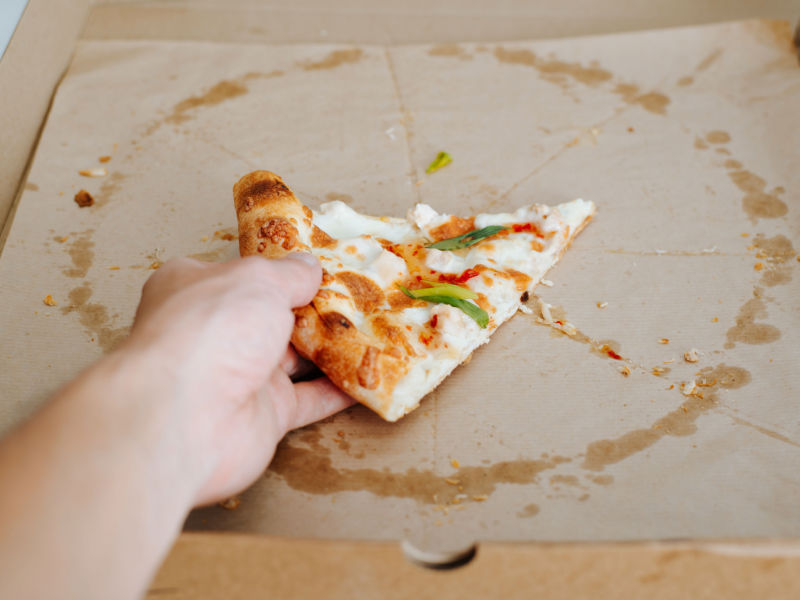
4. Heavy oils in pizza have adverse impacts on a dog's body.
What pizza isn't oily and greasy to some extent?
People might like the taste of that, but it can do a number on our digestive systems.
Well, it does the same to a dog's stomach. Oils mean excess fats, and dogs have a hard time digesting that much fat.
Over the long term, a dog who regularly eats pizza is likely to gain weight and become obese, setting off a chain reaction of dangerous illnesses such as pancreatitis.
5. Pizza crust can lead to obesity over time.

Dogs who eat pizza might especially enjoy the pizza crusts, which are not directly harmful.
However, the pizza crust is mostly sodium and carbohydrates and provides no nutritional value to a dog.
With time, those crusts will add up and can result in obesity for your dog.
Dogs who are already obese or who have a tendency to overeat may face serious health problems in the future.
And keep them far away from raw pizza dough.
Raw dough, in any amount, is bad for dogs.
When dogs eat pizza dough, it's a race against the clock; call your vet immediately.
The yeast in the raw dough causes it to rise when ingested, which can be life-threatening and damage their digestive system.
Summary: Can Dogs Eat Pizza?
The answer to this is very clear – no, dogs should not eat pizza ever, especially as a regular part of their diet.
There are too many potential dangers in both the ingredients and in the toppings to justify giving pizza to your dog and putting his health at risk.
Stay clear of giving any type of fast food or junk food to your dog.
Instead, opt for safer and healthier options to treat your pet, such as blueberries or bananas.
READ NEXT: 9 Superfoods for Dogs That Improve Their Health (According to Science)


